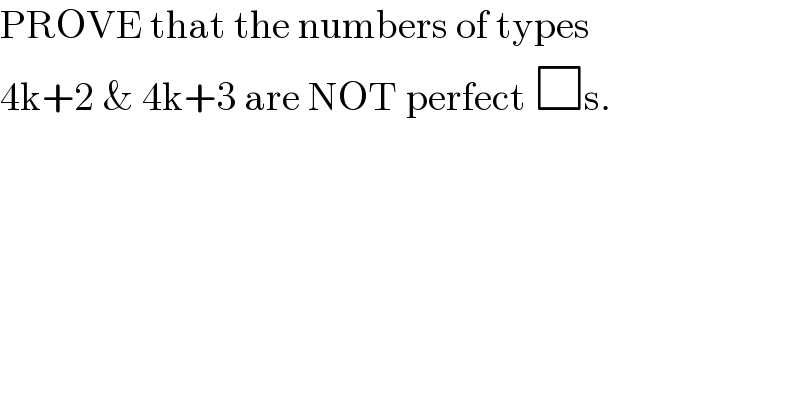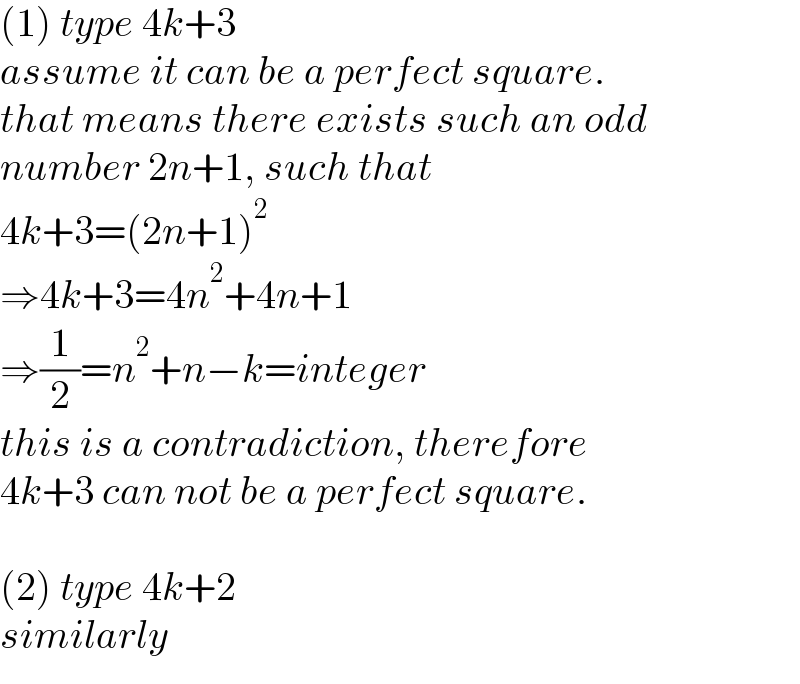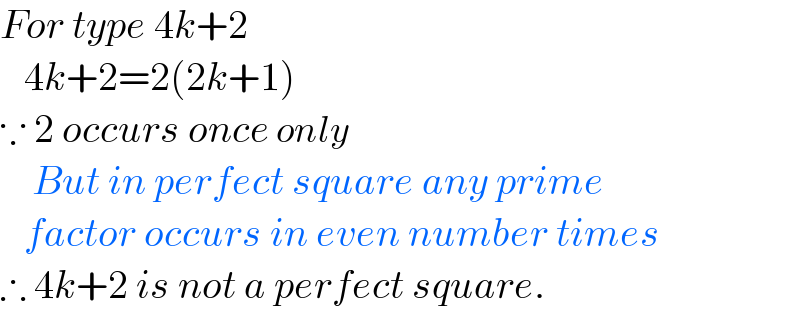Question Number 161528 by Rasheed.Sindhi last updated on 19/Dec/21

$$\mathrm{PROVE}\:\mathrm{that}\:\mathrm{the}\:\mathrm{numbers}\:\mathrm{of}\:\mathrm{types} \\ $$$$\mathrm{4k}+\mathrm{2}\:\&\:\mathrm{4k}+\mathrm{3}\:\mathrm{are}\:\mathrm{NOT}\:\mathrm{perfect}\:\Box\mathrm{s}. \\ $$
Answered by mr W last updated on 19/Dec/21

$$\left(\mathrm{1}\right)\:{type}\:\mathrm{4}{k}+\mathrm{3} \\ $$$${assume}\:{it}\:{can}\:{be}\:{a}\:{perfect}\:{square}. \\ $$$${that}\:{means}\:{there}\:{exists}\:{such}\:{an}\:{odd} \\ $$$${number}\:\mathrm{2}{n}+\mathrm{1},\:{such}\:{that} \\ $$$$\mathrm{4}{k}+\mathrm{3}=\left(\mathrm{2}{n}+\mathrm{1}\right)^{\mathrm{2}} \\ $$$$\Rightarrow\mathrm{4}{k}+\mathrm{3}=\mathrm{4}{n}^{\mathrm{2}} +\mathrm{4}{n}+\mathrm{1} \\ $$$$\Rightarrow\frac{\mathrm{1}}{\mathrm{2}}={n}^{\mathrm{2}} +{n}−{k}={integer} \\ $$$${this}\:{is}\:{a}\:{contradiction},\:{therefore} \\ $$$$\mathrm{4}{k}+\mathrm{3}\:{can}\:{not}\:{be}\:{a}\:{perfect}\:{square}. \\ $$$$ \\ $$$$\left(\mathrm{2}\right)\:{type}\:\mathrm{4}{k}+\mathrm{2} \\ $$$${similarly} \\ $$
Commented by Rasheed.Sindhi last updated on 19/Dec/21

$${Nice}\:\boldsymbol{{sir}}!\:\mathcal{T}{han}\mathcal{X}! \\ $$
Commented by Rasheed.Sindhi last updated on 19/Dec/21

$${For}\:{type}\:\mathrm{4}{k}+\mathrm{2} \\ $$$$\:\:\:\mathrm{4}{k}+\mathrm{2}=\mathrm{2}\left(\mathrm{2}{k}+\mathrm{1}\right) \\ $$$$\because\:\mathrm{2}\:{occurs}\:{once}\:{only} \\ $$$$\:\:\:\:{But}\:{in}\:{perfect}\:{square}\:{any}\:{prime}\: \\ $$$$\:\:\:{factor}\:{occurs}\:{in}\:{even}\:{number}\:{times} \\ $$$$\therefore\:\mathrm{4}{k}+\mathrm{2}\:{is}\:{not}\:{a}\:{perfect}\:{square}. \\ $$
